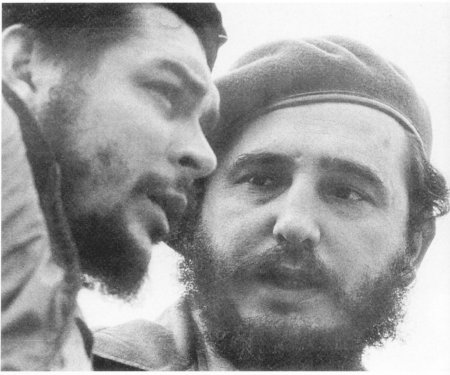
Aug '02 [Home]
Essays
Translating for Castro, 'Agricultural Leader with No Political Aspirations'
by Witold Kondracki
I
n June 1958, I was hired by an Italian-American millionaire, Mr. L, to build houses on his beachfront property on the Isle of Pines in Cuba. We flew to Havana and then took another plane some 40 miles south to the site. Batista was in control. American money was pouring in.The main prison of Cuba was on the Isle of Pines.[*] Mr. L. paid the commandant of the prison a dollar a day per prisoner to supply 100 workers— murderers and thieves—to build the houses. They came with four machine gun-toting guards. All I had to do was feed them. This I did with the help of a few Cuban boys who went fishing every morning and brought back nets full of fish which were then prepared by an Italian cook. At times we hunted for wild pigs which were then added to the fare. Each man was given a small glass of rum at the end of the day (my idea).
With their bare hands and shovels, they built a five-mile road which extended from the main road in Nueva Gerona to the beachfront property. They leveled the land and dug ditches on either side. I instructed them how and they built wooden forms and poured the concrete for the three-bedroom houses which had floors, walls and roofs of reinforced concrete and concrete blocks. The houses were one storey high and spacious.
One house had been completed and another begun when Castro came to the Isle on the 8th of January, 1959. He came with Ché Guevara and several members of his militia to give an hour-long speech on a street in Nueva Gerona. There were perhaps 250 to 300 people there. I knew enough Spanish by that time to be able to translate for a small group of Americans who attended. They grew watermelons on the Isle.

Ché Guevara, who impressed me as a charming man and an idealist, expressed delight that I, a Canadian, had enough command of Spanish to be able to act as translator. Castro praised himself and his movement and made many promises about bettering the economy, the education, the lives of the people. The audience was entranced, friendly, hope-filled, naïve and poor, very poor.
Castro appointed as mayor of Nueva Gerona a woman who had something on just about everyone and thus acquired a social standing beyond her wildest dreams. No worry about loyalty there.
I traveled to Havana after the speech and went to the American Embassy, where I offered my assessment of Castro: a Communist bent on revolution. They were amused and told me that since I came from Poland, a country that had been taken over by Communists, I was a bit paranoid. They told me that Castro was an 'agricultural leader with no political aspirations.' A week later, Castro confiscated everything on the Isle in the name of the revolution.
I realized that I had to leave Cuba and, with the help of a friend, I was able to escape to Havana by stowing away under the bananas on a banana boat. In Havana, he bought a plane ticket and escorted me to the plane. I boarded without problem. It was a relief when the plane lifted off from Cuban soil.
The next day, it was declared that anyone leaving the island had to have police clearance.
I loved the people. I loved their music. In many ways it was a paradise.
(Witold Kondracki, born in Poland, has lived dozens of such stories around the world. He shared this one orally and his words were then transcribed. Now in his eighties, he lives quietly with his wife on Manhattan's Upper West Side.)
[*] Situated off the southwestern coast of Cuba, originally named "Isla de la Juventud" ('youth'), the island was ceded to the U.S. (1898) in the Spanish-American War, then repatriated by treaty in 1925. Castro himself was a prisoner there in 1953. —Eds. [Back to text]
[Guevara/Castro photo, source: www.lpdw.free.fr/guevara/galerie.htm]